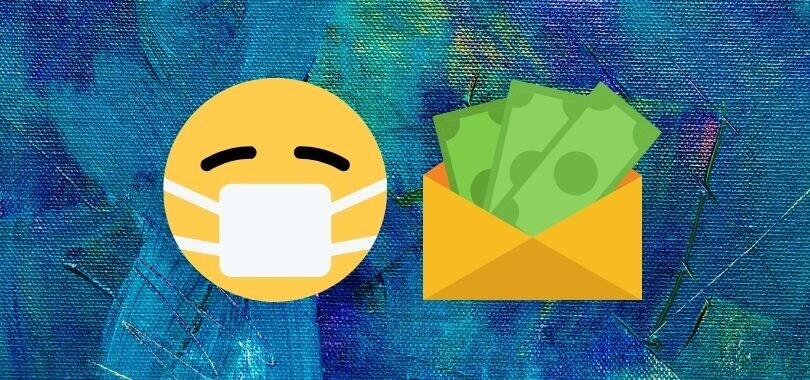Coronavirus is affecting all aspects of our lives, and yes, it is also higher education. Here are some of the most important things you should know about COVID-19 and student loans.

Introduction of the CARES Act
In response to COVID-19, the federal government has introduced a new law, the Coronavirus Aid, Relief, and Economic Security Act. Also known as the CARES Act, this law provides some relief to student borrowers.
Student Loan Payment Pause
One of the main features of the CARES Act is a 6-month automatic suspension of principal and interest payments on certain federal student loans. This automatic payment pause ends on September 30, 2020.
If your federal student loans are eligible, you don’t have to make any principal or interest payments till September 30, 2020.
You don’t need to apply for the student loan payment pause benefit. If your federal student loans are eligible, the payment pause and interest waiver is automatically applied to your loan. However, don’t just take this for granted. It is always a good idea to log in to your account to confirm that your federal student loans are not accruing any interest.
These suspended payments will count towards any student loan forgiveness program.

How to Know if Your Loans Are Eligible For the Payment Pause and Interest Waiver
Here’s the list of loans that are eligible for both the payment pause and interest waiver under the Cares Act:
If you have any of the above loans, the payment pause and interest waiver should have been applied automatically. As of now, this pause and waiver will end on September 30, 2020 but keep an eye out for notifications of an extension.
Loans that are NOT eligible for the payment pause and interest waiver under the CARES Act:
- Private student loans
- Private parent loans
- Federal Perkins Loans, this is even if the loans are held by the federal government
- Federal education loans made under the Federal Family Education Loan Program (FFELP) – the exception to this are all FFELP loans made in 2008–09 and 2009–10 if the title was transferred to the U.S. Department of Education through the Ensuring Continued Access to Student Loans Act of 2008
- Parent PLUS loans made under the FFEL program – the exception to this are ECASLA loans or loans that are in default.
How the Pause and Waiver Affect Loan Forgiveness
The paused payments count toward all of these loan forgiveness programs:
- Public Service Loan Forgiveness (PSLF)
- 20/25-year loan forgiveness at the end of an income-driven repayment plan
- Rehabilitation of defaulted federal student loans.
A Look at Your Options If You Have Ineligible Student Loans
You may be able to convert some ineligible federal student loans into eligible loans to benefit from the payment pause and interest waiver. In most cases however, you will end up having to compromise one benefit for another.
Any FFELP loans and Federal Perkins that you include in a Federal Direct Consolidation Loan may become eligible for a pause and waiver. However, you may lose out on the benefits that these loans offer if you choose to consolidate them. Speak to your loan servicer before you decide to consolidate your FFELP loans or Federal Perkins loans to determine if it is worth the trade-off.
Private student loans cannot be converted into eligible loans. You will have to continue making monthly payments on these loans as before. Speak to your lender to find out if they are offering any leniency during this time. Some lenders have special programs in place to offer financial relief to borrowers affected by COVID-19. Check with your lender to determine whether or not you are eligible. The other option is to consider applying for forbearance, which offers you temporary suspension of repayments. This can help you regroup and build your finances.
Other Financial Relief Options Available On Ineligible Federal Student Loans
If you have federal student loans that are ineligible for the benefits offered by the Cares Act, there are other options available.
Find out if your federal student loan qualifies for unemployment deferment, economic hardship deferment or a forbearance. The federal government will pay the interest on subsidized loans during deferment. However, they do not pay the interest on deferred unsubsidized loans. They also do not pay the interest on any loans during a forbearance.
Has COVID-19 Has Affected Collection Efforts?
Yes, it has. The U.S. Department of Education has stopped all collected efforts on defaulted federal student loans. They will be no wage garnishment until further notification. They have also halted the offset of Social Security benefit payments and the offset of federal income tax refunds.
This halt on collection efforts is with retrospective effect. Any amounts collected from March 13, 2020 onward will be refunded.
COVID-19 and Student Loans Forgiveness Programs
With all schools having to forcibly shut down, many student borrowers are unable to fulfill their Teacher Loan Forgiveness or TEACH Grant requirements. If you were hoping to avail of forgiveness through these programs, here’s what you need to know.
If you were unable to complete the current year’s teaching service, the partial year will be considered as a full year of service. So you still qualify for forgiveness.
You will also get the full forgiveness benefits if your teaching services were switched from full-time to part-time.
The requirement for consecutive years of service in the Teacher Loan Forgiveness has also been waived with a caveat. To get this benefit, you must resume teaching after the coronavirus emergency has been lifted and schools re-open.
The Federal government has eased a lot of restrictions to help student borrowers during this crisis and massive unemployment. Make sure to check the student aid site regularly to stay updated on the latest developments.


